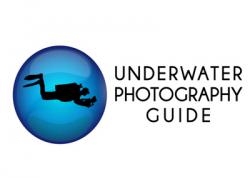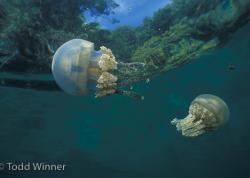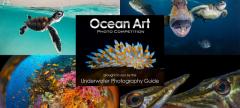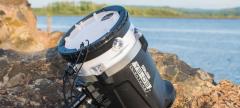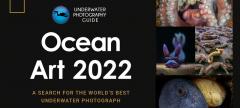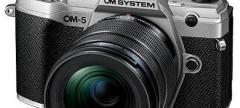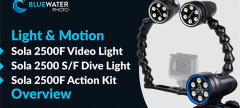Lembeh Straits
When divers want to photograph strange creatures, they think Lembeh. Muck diving? Lembeh. Lembeh, with it's great selection of resorts and well-trained dive guides, might be the best muck diving and macro underwater photography destination in Indonesia.
Lembeh Straits lies near Manado, Sulawesi in Indonesia. After flying to Manado, you can be in the water usually within a couple hours. It is easy to dive Bunaken, known for its great corals and large fish, on the same trip as diving Lembeh, transfering between the two only takes a couple of hours.

Mantis shrimp with eggs, photo by Mike Bartick
A typical Lembeh underwater photography dive
A typical Lembeh Strait dive site is mostly sand, with small scattered patches of sponges, reef, or anemones. Your dive guide will bring you and 1-3 other divers down to about 60-80ft depth, where you start to look for photo subjects and slowly make your way shallower. The small patches of life are typically homes marine life such as clownfish, crinoid shrimps, small frogfish, pipefish, seahorses, nudibranchs, harlequin shrimp, etc. In the sand the dive guide will be looking for species such as various octopus, snake eels, mantis shrimp, gobies, nudibranchs, sanddivers, etc. You will be somewhat spread out, each person usually photographing one subject while the dive guide find the next subject. In the shallows juvenile fish are usually more common. It is good to discuss beforehand the rules your group will use for how long to stay with a subject, staying downcurrent of other divers because of silt, finning technique, etc.

Hairy frogfish, photo by Mike Bartick
Lembeh Strait marine life
Lembeh is heaven for the macro underwater photographer. Lembeh straits has a great assortment of strange fish, macro critters and nudibranchs. You can view photos and a list of all the Lembeh marine life in the muck diving critter guide.
On my trip to the Lembeh Strait, highlights included seeing 2 hairy frogfish, flamboyant cuttlefish, juvenile barramundi, juvenile pinnate batfish, purple rhinopia, harlequin shrimp, mandarin fish, a beautiful snakeblenny in the open, and large beautiful stinging anemones.
Other notable sightings in Lembeh included:
Many different seahorses and pipefish, 3 different squid species, 3 different cuttlefish species, octopus, many different filefish, cowfish, and boxfish; bubble shrimp, tiger shrimp, crinoid shrimp , anemone shrimp, many other shrimps and crabs; bengai cardinalfish; many different gobies and blennies; snake eels, garden eels, ribbon eels, various other eels. many, many mantis shrimp. razorfish, convict blennies, schooling juvenile catfish, blue-fin trevally. pegasus sea moth, demon stingers, flying gurnards, many lionfish and pufferfish, whip coral gobies, bristle worms, cuckatoo waspfish, many different clownfish/anemone fish, many large & interesting anemones, many nudibranchs

Underwater photo of a soft coral crab, photo by Mike Bartick
Best time to visit Lembeh Straits
Lembeh can be dove at any time of the year. Dec-Feb are the rainy months but the visibility will still be fine for macro photography. Lembeh has been getting crowded recently, so try to go in the off season. Hopefully the dive sites will get mooring lines someday.
Lembeh water temperatures
July and August have the coldest water temperatures, getting down to 25 celsius (77F). Bundle up! Some people think the most critters are out during the cold months. Water temps get up to 29 celsius (84F) in Jan-Feb. Wear a full wetsuit year round.

Napolean snake eel, Lembeh Strait
Lembeh Straits dive sites
The dive sites in Lembeh are generally sand, rock, muck, or rubble, but there are a couple sites with nice corals and walls. Marine life is generally prolific from 3-4 meters depth down to 25 meters depth. I prefer to dive on nitrox. Police pier, Nudie falls, Nudie Retreat and TK3 are definitely target-rich environments that you want to dive early and often. California dreaming and Angel's falls offer good wide-angle opportunities.
Questions to ask the Lembeh dive resorts
What is the max number of divers per guide? (3 is good, 2 is great)
Are night dives included or extra? (you want to do lots of night dives!)
Is there a charge for house reef dives? Can I dive there solo?
How many dives are offered a day?
Do you offer nitrox? 32 and 36 percent, or only 32? If I dive Nitrox, will the guide also dive nitrox?
Is there a time limit on dives?
Is water, coffee or food brought on the boats?
Best lenses for Lembeh straits underwater photography
60mm macro lens on a cropped sensor will be useful on a majority of your dives
105mm lens with a flipon wet diopter can be useful for creative photos and small shrimps & crabs
Tokina 10-17mm lens or a nikon 10.5mm fisheye with a 1.4x tele can be useful for creative CFWA (macro-wide-angle) photos of the larger seahorses, frogfish, rhinopias, eels out in the open, and any other subject that you can get close to.
Lembeh Dive Resort Options
For the best Lembeh resort options, visit the Lembeh dive resort page on our sister website, Bluewater Travel
Lembeh underwater photos
Except for the 3 photos taken by Penelope and the last three at the end, these photos were taken without a strobe. Unfortunately I had strobe / housing problems that couldn't get fixed while I was in Lembeh. I had to use my dive light instead, which is less than ideal, but better than nothing. These photos were taken in March of 2008.

Convict blennies. These convict blennies at first glance look similar to schooling juvenile catfish, but lack the barbels, and are smaller.

Juvenile barrimundi cod, seen at the Two Fish house reef. These guys are so cute and flop around like an underwater dumbo. Taken with a 105mm lens

Mantis shrimp. We saw many mantis shrimp in Lembeh. Taken with a 105mm lens.

Garden eel. There's a few different species of garden eels in Lembeh. 105mm lens

Demon stinger. This guy was buried in the sand. 105mm lens, Lembeh straits

Open your mouth! Yawning Paddleflap Rhinopia. Photo by penelope foo

Spinecheek anemonefish, Photo by penelope foo

Female Ribbon eel, 105mm lens, Lembeh straits, photo by Scott Gietler

Beautiful stinging anemone, Actinodendron plumosum. Fuji F30 camera, Photo by Scott Gietler

Magnificent sea horse, 105mm lens, Lembeh straits

Blue ring octopus, photo by Ene Anuar with a Canon G10

Mating Mandarin Fish

Mimic Octopus

Ambon Scorpionfish
Further Reading

RECOMMENDED ARTICLES
SUPPORT THE UNDERWATER PHOTOGRAPHY GUIDE:
The Best Service & Prices on u/w Photo Gear
 Visit Bluewater Photo & Video for all your underwater photography and video gear. Click, or call the team at (310) 633-5052 for expert advice!
Visit Bluewater Photo & Video for all your underwater photography and video gear. Click, or call the team at (310) 633-5052 for expert advice!
The Best Pricing, Service & Expert Advice to Book your Dive Trips
 Bluewater Travel is your full-service scuba travel agency. Let our expert advisers plan and book your next dive vacation. Run by divers, for divers.
Bluewater Travel is your full-service scuba travel agency. Let our expert advisers plan and book your next dive vacation. Run by divers, for divers.




